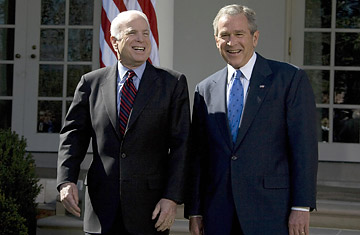
President George W. Bush endorses John McCain in the Rose Garden of the White House, March 5, 2008.
The Democratic strategy for beating John McCain is pretty simple. Its principal element: Tie McCain to President Bush, no matter how hard he struggles to break free.
Last week illustrated the maneuvering over Bush. McCain started the week with a speech on global warming, where he broke with the President. By the week's end, though, McCain had been drawn into a fight over Mideast policy between Barack Obama and the White House, with McCain taking Bush's side. Obama knows that voters do not yet trust him on foreign policy. But he also knows that they are even more wary of what Democrats call "a third Bush term."
The strategic choices for McCain are much trickier. Bush is unpopular with the public at large, but many Republicans still support him. The Republicans who disapprove of Bush are split further, between those who fault Bush for being too conservative and those who fault him for not being conservative enough. The first group thinks Bush should have signed the Democrats' bill to expand the children's health-care program. The second group thinks he should not have created a prescription-drug program for the elderly.
McCain won the Republican primaries mostly because of his strength among anti-Bush Republicans, but he still has far to go among anti-Bush independents. Pro-Bush Republicans, meanwhile, remain distrustful of him, and every time he courts the more moderate voters — by reiterating his support for caps on carbon emissions, for example — their distrust grows.
McCain and Bush fought fiercely for the Republican nomination in 2000, and the bad blood lasted for several years. Now both of them want McCain to win, and McCain wants Bush to do everything he can to help — which sometimes will include keeping a low profile. Democratic ads include footage of McCain hugging Bush. It is a notably awkward embrace.
Polls show that people would strongly prefer to elect a Democrat for President. Republicans are competitive only because Obama and Clinton both do worse in the polls than a generic Democrat, and McCain runs better than a generic Republican. If McCain becomes a Bush Republican, as the Democrats hope, he will no longer stand a chance.
Under the circumstances, McCain cannot really run either as an anti-Bush or as a pro-Bush Republican. He has to move beyond Bush. He also has to move beyond his party's divisions over Bush. Too many of the anti-Bush Republicans believe that merely returning to a pre-Bush Eden of rock-ribbed conservatism would bring the party back to power.
In truth, Newt Gingrich's Republican Party was declining in the 1990s. Once welfare reform passed and crime dropped, middle-class Americans stopped seeing the federal government as a threat to their interests and values. They began to look more kindly on government activism. Bush's "compassionate conservatism" was a response to this public mood. Its inadequacy is now obvious to almost everyone. But Bush saw his party's problems more clearly than many of his conservative critics now do.
Several Republicans have written books to figure a way their party can get out of its mess. McCain should take the time to read the best of them: Ross Douthat and Reihan Salam's forthcoming Grand New Party. They argue that the reason the Republicans never replaced the Democrats' New Deal majority with a durable majority of their own is that they have never had the full allegiance of working-class voters. Working-class white voters sided with Republicans on culture and values, but with the Democrats on such economic issues as the minimum wage and health care. Working-class black and Hispanic voters, meanwhile, have sided with Democrats for economic reasons and others as well.
McCain's most plausible path to victory is to court these economically anxious, mildly socially conservative voters. He is already standing with them on values: When California's supreme court imposed same-sex marriage on the state, he said that he did not think judges should be deciding the issue. But he needs to explain how he would make it easier for these voters to move up the income ladder and get affordable and dependable health insurance.
What McCain should do, in a way, is to take the same approach to domestic policy that he did to Iraq. He criticized Bush when he thought our war strategy was failing, and backed him when Bush embraced a better one. Instead of following Bush blindly or denouncing him blindly, the way most politicians in both parties did, he was his own man. If he becomes his own man on domestic policy, too, the contrast will draw itself.
